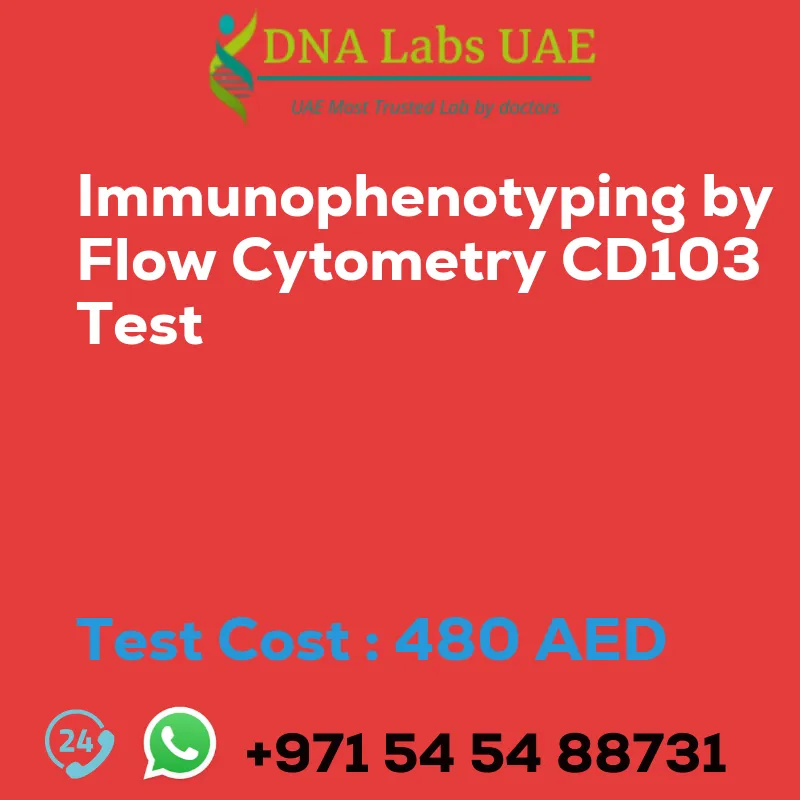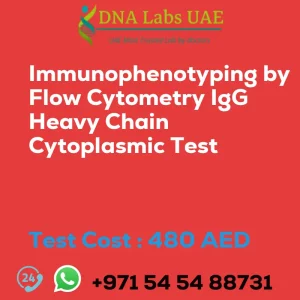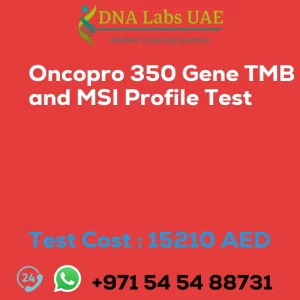IMMUNOPHENOTYPING BY FLOW CYTOMETRY CD103 Test
Test Name: IMMUNOPHENOTYPING BY FLOW CYTOMETRY CD103 Test
Components: CD103 Test
Price: 480.0 AED
Sample Condition: 3 mL (2 mL min.) whole blood in 1 Lavender Top (EDTA) tube and 3 mL (2 mL min.) whole blood in 1 Green Top (Sodium Heparin) tube OR 2 mL (1 mL min.) Bone marrow in 1 Green Top (Sodium heparin) tube. Ship immediately at 18-22°C. DO NOT REFRIGERATE OR FREEZE. Specify time, date, and clinical details on the test request form.
Report Delivery: Sample Daily by 9 am; Report Same day
Method: Flow Cytometry
Test type: Cancer
Doctor: Oncologist, Hematologist
Test Department: FLOW CYTOMETRY
Pre Test Information: Give brief clinical history.
Test Details:
The CD103 test is a flow cytometry-based immunophenotyping assay used to detect the presence of CD103 antigen on the surface of cells. CD103, also known as integrin alpha E (ITGAE), is a cell adhesion molecule that plays a role in immune cell trafficking and tissue homing.
In flow cytometry, cells are labeled with fluorescently labeled antibodies specific to CD103. The cells are then passed through a flow cytometer, which measures the fluorescence intensity of each cell. If CD103 is present on the cell surface, the corresponding antibody will bind to it, resulting in a positive signal.
The CD103 test is commonly used in research and clinical settings to identify specific immune cell populations. It is particularly useful in identifying certain subsets of T cells, such as tissue-resident memory T cells (TRMs) and regulatory T cells (Tregs), which express CD103.
The information obtained from the CD103 test can provide insights into the immune response in various diseases, including autoimmune disorders, inflammatory bowel disease, and cancer. It can also help in understanding immune cell trafficking and tissue-specific immune responses.
Overall, the CD103 test is a valuable tool for immunophenotyping studies and can contribute to a better understanding of immune cell populations and their functions in health and disease.
| Test Name | IMMUNOPHENOTYPING BY FLOW CYTOMETRY CD103 Test |
|---|---|
| Components | |
| Price | 480.0 AED |
| Sample Condition | 3 mL (2 mL min.) whole blood in 1 Lavender Top (EDTA) tubeAND 3 mL (2 mL min.) whole blood in 1 Green Top (Sodium Heparin) tube OR 2 mL (1 mL min.) Bone marrow in 1 Green Top (Sodium heparin) tube. Ship immediately at 18\u0192??22?\u00f8C. DO NOT REFRIGERATE OR FREEZE. Specify time, date and clinical details on test request form. |
| Report Delivery | Sample Daily by 9 am; Report Same day |
| Method | Flow Cytometry |
| Test type | Cancer |
| Doctor | Oncologist, Hematologist |
| Test Department: | FLOW CYTOMETRY |
| Pre Test Information | Give brief clinical history. |
| Test Details |
The CD103 test is a flow cytometry-based immunophenotyping assay used to detect the presence of CD103 antigen on the surface of cells. CD103, also known as integrin alpha E (ITGAE), is a cell adhesion molecule that plays a role in immune cell trafficking and tissue homing. In flow cytometry, cells are labeled with fluorescently labeled antibodies specific to CD103. The cells are then passed through a flow cytometer, which measures the fluorescence intensity of each cell. If CD103 is present on the cell surface, the corresponding antibody will bind to it, resulting in a positive signal. The CD103 test is commonly used in research and clinical settings to identify specific immune cell populations. It is particularly useful in identifying certain subsets of T cells, such as tissue-resident memory T cells (TRMs) and regulatory T cells (Tregs), which express CD103. The information obtained from the CD103 test can provide insights into the immune response in various diseases, including autoimmune disorders, inflammatory bowel disease, and cancer. It can also help in understanding immune cell trafficking and tissue-specific immune responses. Overall, the CD103 test is a valuable tool for immunophenotyping studies and can contribute to a better understanding of immune cell populations and their functions in health and disease. |








